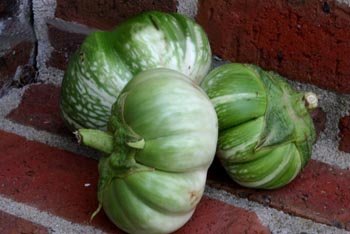





I'm growing big purple berries weighing about a half-pound each in my garden. That's impossible you say, but it isn't.
Eggplants are berries. So are tomatoes, bananas and watermelons. Any fleshy plant that is produced from a single ovary is a berry. And while that information is intriguing, we're focusing on eggplants today.
Eggplants, or aubergines, or brinjals as they are called around the world originated in southern Asia. This member of the Solanaceae family that can count tomatoes, potatoes and peppers among its relatives is a dense, fleshy fruit that thrives in hot, humid conditions and they are an important ingredient in Indian and Asian cooking. Eggplants were depicted in art and early b.c.e. writings in China and were also popular in pre-history Vietnam, Burma and Persia.
 Like its cousin, the tomato, eggplants were first a decorative curiosity in European gardens, despite the fact that a good portion of the world considered them a tasty food source. Our European ancestors were suspicious of anything new and it often took centuries for any of them to experiment and take a taste test. Dire predictions from experts proclaimed that consuming it would cause a number of grievous ailments including leprosy, epilepsy and insomnia. Eggplant was also believed to cause uncontrollable amorous feelings and genteel ladies were advised to avoid them at all costs.
Like its cousin, the tomato, eggplants were first a decorative curiosity in European gardens, despite the fact that a good portion of the world considered them a tasty food source. Our European ancestors were suspicious of anything new and it often took centuries for any of them to experiment and take a taste test. Dire predictions from experts proclaimed that consuming it would cause a number of grievous ailments including leprosy, epilepsy and insomnia. Eggplant was also believed to cause uncontrollable amorous feelings and genteel ladies were advised to avoid them at all costs.
In India and the rest of the Far East, eggplant was grown for food and also used in medicine. Being a member of the notorious nightshade family, the leaves, flowers and stems do contain harmful compounds and some scholars recommended avoiding the fruit as well. Physicians used these compounds to produce cures for anything from diabetes and toothaches to asthma, but there is no scientific evidence that any of these cures were actually effective.
Today, China and India lead the world in eggplant production. Mediterranean countries also grow it commercially for shipment into the more northern parts of Europe. The world has embraced this interesting berry and they have good reason. Eggplant is quite nutritious and comes in a vast array of colors and shapes. It is a great source of fiber, copper, vitamins K, B1, B3, and B6 along with potassium and manganese. Eggplant is also a good source of antioxidants, especially nasunin which is known as a free-radical scavenger. This compound is known to protect lipids, which in turn helps cells let nutrients in and push wastes out.
Grow eggplants in sunny well-drained conditions. They like the heat, so don't transplant them outdoors too early. Start your transplants from seed about the time you start pepper plants, which is abut 8 to 10 weeks before your projected plant-out date. Make sure the soil has warmed because eggplants will simply sulk and fail to thrive if conditions are too cool. Most varieties will need staking as they can grow several feet (a meter) tall and with fruit set, can become quite top-heavy. Eggplants are ready to harvest when they change color, although you can leave them on the plant to grow larger if you wish. As long as the skin is glossy and vibrant, they can be harvested. Once the skin dulls, they're over-ripe and bitter.
I tend to harvest my eggplants small and since I prefer the long Asian types, that means at about 6 inches long. (about the size of a small banana) They work great in recipes and the seeds haven't matured to the point that they are unattractive. My favorite recipe is a simple one and makes great use of summer produce. It is a basic ratatouille. I heat a little olive oil and slice an eggplant, a summer squash, some sweet pepper, onion and tomato. I scramble this together with salt, pepper and about a teaspoon of Italian salad dressing. When the veggies are done, I grate a bit of Parmesan cheese over it and enjoy. It makes a wonderful supper and you never miss the meat. It takes about 15 minutes and I use my electric skillet, so the stove is never turned on, unless you want to bake some crusty Italian bread to go with it, but in the summer, I find it quite unnecessary.
Eggplants grow well in large pots and make an attractive plant for a sunny container garden, so why not grow some of these healthy berries for yourself next season? They are beautiful, nutritious and easy.
Copyright © www.100flowers.win Botanic Garden All Rights Reserved